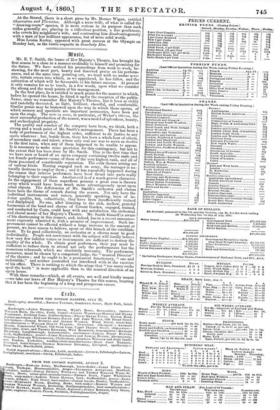Mr. E. T. Smith, the lessee of Her Majesty's Theatre,
has brought his first season to a close in a manner creditable to himself and promising for the future. We have noticed his proceedings from week to week, be- stowing, for the most part, hearty and deserved praise on his perform- ances, and at the same time pointing out, we trust with no undue seve- rity, certain errors into which, as we apprehend, he has fallen, and the correction of which will be favourable to his future success. At present it only remains for us to touch, in a few words, upon what we consider the strong and the weak points of his management. In the first place, he is entitled to much praise for the manner in which, before he opened the house, he fitted it up for the reception of the public. Never, since we remember Her Majesty's Theatre, has it been so richly and tastefully decorated, so light, brilliant, cheerful, and comfortable. Similar praise may be bestowed upon the way in which those operas, of which scenery and spectacle are important accessories, have been put upon the stage. The mise en scene, in particular, of Weber's Oberon, the most successful production of the season, was a model of splendour, beauty, and archeological propriety. The quality and number of the company have been, we think, both a strong and a weak point of Mr. Smith's management. There has been a body of performers of the highest order, sufficient to do justice to any opera whatever : but, beside them, there has been a whole host of others, of secondary rank and talent, whose only real use was to serve as doubles to the first rates, when any of them happened to be unable to appear. It is necessary to make some provision for this contingency, but not to the extent that has been done by Mr. Smith. This is the first time that we have seen or heard of an opera company containing twelve male and ten female performers-some of them of the very highest rank, and all of them possessed of considerable reputation. The evils thence arising are of various kinds. Having engaged such an army, the manager is na- turally desirous to employ them ; and it has repeatedly happened during the season that inferior performers have been thrust into parts really belonging to their superiors. Another evil is of a much graver character. In the engagement of these superftous persons a great sum is thrown away which would have been much more advantageously spent upon other objects. The deficiencies of Mr. Smith's orchestra and chorus have been the theme of remark during the season. Not only have the individual instruments and voices, generally speaking, been of in- ferior quality, but, collectively, they have been insufficiently trained and disciplined. No one, after listening to the rich, mellow, grateful harmonies of the band and chorus of Covent Garden, engaged, trained, and conducted by Costa, could hear with any satisfaction the orchestral and choral music of her Majesty's Theatre. Mr. Smith himself is aware of his shortcoming in this respect, and, indeed, has in a recent announce- ment expressly admitted it, with a promise of improvement. Such im- provement cannot be effected without a large increase in the amount at present, we have reason to believe, spent on this branch of the establish- ment. To be good collectively, an orchestra or a chorus must be good individually. People not conversant with the subject will hardly believe how very few inferior voices or instruments are sufficient to destroy the quality of the whole. To obtain good performers, their pay must be sufficient to induce them to attend not only the performances but the numerous rehearsals which are absolutely necessary. The performers, moreover, must be chosen by a competent judge, the "musical Director" of the theatre ; and he ought to be a permanent functionary, "one and indivisible," and neither controlled nor interfered with in the exercise of his office. There is nothing to which the adage that "too many cooks spoil the broth" is more applicable than to the musical direction of an opera house.
With these remarks-which, at all events, are well and kindly meant -we take our leave of Her Majesty's Theatre for this season, trusting that it has been the beginning ot a long and prosperous career.


























 Previous page
Previous page